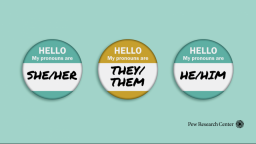
At Youth Music we’ve recently added our pronouns (i.e. she/her, they/them, he/him) to our email signatures and staff members' bios. We want to explain why, and to encourage others to do the same.
Promoting Inclusivity: The Importance of Adding Pronouns to Your Communications
Adding your pronouns in your communications is a small but easy way to be more inclusive and normalise discussions surrounding gender.
In particular, it allows transgender and non-binary people to let others know which pronouns they’d like to be used, and therefore avoids them being misgendered.
If you are cisgender (your gender identity matches the sex you were assigned at birth), having your pronouns in your email signature or online bio shows that you are an ally to trans and non-binary people, and also that you don’t make assumptions about anyone’s gender. It can also be useful for anyone who has gender-ambiguous names.
Understanding gender neutral pronouns
They/them pronouns are considered gender neutral and are often used for someone who might not identify as strictly male or female – like the pop star Sam Smith. TU3SDAY, who was nominated for a Rising Star Award (Artist) sponsored by Dr. Martens at the Youth Music Awards, uses they/them pronouns.
It’s worth noting that someone’s gender identity (the gender they identify as internally) doesn’t always align with their gender expression (how they look).
Respecting Pronouns: Key to a Respectful, Inclusive Environment
We want to make sure our charity continues to be respectful, inclusive, diverse and safe for everyone who comes into contact with us. This is all the more important for anyone working with young people, as those born after 1996 are more likely than any other generation to have fluidity in gender identity.
If someone lets you know the pronouns they’d like you to use to refer to them, please be respectful of this. And if you’re unsure when you first meet someone, it’s ok to ask!
The video below from As/Is is really useful for learning why pronouns matter for trans and non binary people.
Youth Music fights for change in the music industries, on behalf of and alongside young people. We’re here particularly for those who face barriers, those who are marginalised, those who are missing out. Trans and non-binary people face immense challenges, not least a hostile media environment. Using someone’s pronouns correctly is simple, respectful and important.
Since our beginnings in 1999, Youth Music has championed the importance of inclusion in music making, learning and earning. Read more about the work we have been doing to ensure every young person can experience inclusive music from ages 0-25.
